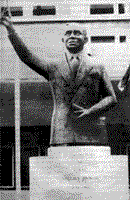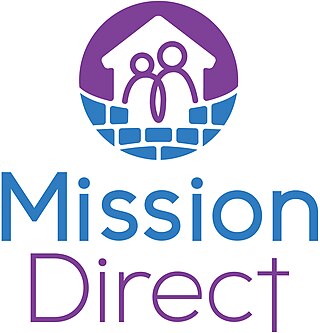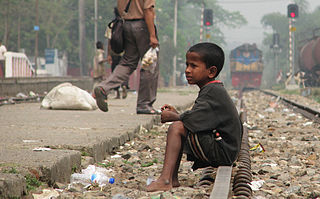Related Research Articles
The Save the Children Fund, commonly known as Save the Children, is an international, non-government operated organization. It was founded in the UK in 1919, with the goal of helping improve the lives of children worldwide.

Street children are poor or homeless children who live on the streets of a city, town, or village. Homeless youth are often called street kids, or urchins; the definition of street children is contested, but many practitioners and policymakers use UNICEF's concept of boys and girls, aged under 18 years, for whom "the street" has become home and/or their source of livelihood, and who are inadequately protected or supervised. Street girls are sometimes called gamines, a term that is also used for Colombian street children of either sex.

Isaac Theophilus Akunna Wallace-Johnson was a Sierra Leonean, British West African workers' leader, journalist, activist and politician.

The individual member states of the African Union (AU) coordinate foreign policy through this agency, in addition to conducting their own international relations on a state-by-state basis. The AU represents the interests of African peoples at large in intergovernmental organizations (IGO's); for instance, it is a permanent observer at the United Nations' General Assembly.
Children on the Edge is a non-profit charitable organisation dedicated to working on behalf of some of the most marginalised children around the world. The organisation is based in Chichester and was founded by the owner of The Body Shop, Dame Anita Roddick, (DBE) in 1990 following her visit to several Romanian orphanages. It was co-founded by Rachel Bentley, who has led the organisation to this day.
The Scottish Catholic International Aid Fund, better known by its acronym SCIAF, is the official aid and development agency of the Roman Catholic Church in Scotland. Established in 1965, SCIAF now works in eight countries across Asia, Africa and Latin America and providing assistance to vulnerable people. SCIAF works with partner organisations and has responded to humanitarian disasters with emergency provisions and support. In Scotland, SCIAF raises awareness of the underlying causes of global poverty and injustice, work that includes visiting schools.

Terre des hommes, also capitalized as Terre des Hommes, is an international children's rights charitable humanitarian umbrella organization under the aegis of the International Federation of Terre des Hommes (TDHIF), with independent organizations in Canada, Denmark, France, Germany, Italy, Luxembourg, the Netherlands, Switzerland, Spain, and Syria. It was founded in 1960 by Edmond Kaiser in Lausanne, Switzerland. The organization is named after Antoine de Saint-Exupéry's 1939 philosophical memoir Terre des hommes. An important part of the TDHIF's work is as a consultant to the United Nations Economic and Social Council (ECOSOC). Promoting the Convention on the Rights of a Child is an important activity of Tdh. Advocating for children's rights, defending them, and spreading information are tasks which Terre des Hommes – to the aid of children considers a priority. TDHIF runs the two campaigns "Destination Unknown" – Children on the Move (www.destination-unknown.org) and "Children Win" – Changing the Game of Mega Sporting Events (www.childrenwin.org). Foundation of the organization was awarded Balzan Prize in 2018.
Prostitution in Sierra Leone is legal and commonplace. Soliciting and 3rd party involvement are prohibited by the Sexual Offences Act 2012. UNAIDS estimate there are 240,000 prostitutes in the country. They are known locally as 'serpents' because of the hissing noise they use to attract clients.
Sexual exploitation and abuse in humanitarian response first came to public attention with the release of a report in February 2002 of a joint assessment mission examining the issue. The joint mission reported that "refugee children in Guinea, Liberia and Sierra Leone have been subjected to sexual abuse and exploitation, reportedly by employees of national and international NGOs, UNHCR and other UN bodies..." Humanitarian agencies responded almost immediately with measures designed to prevent further abuse, setting up an inter-agency task force with the objective of "strengthening and enhancing the protection and care of women and children in situations of humanitarian crisis and conflict..." In 2008 there were signs that sexual exploitation and abuse of beneficiaries not only continued, but was under-reported. In January 2010, the ECHA/ECPS task force developed a website devoted to protection from sexual exploitation and abuse (PSEA) by personnel of the United Nations (UN), non-governmental organizations (NGOs) and other international organizations.

The World Association of Children's Friends (AMADE) is a charity organization founded by Grace, Princess of Monaco, to support the development, education, and health of children worldwide. AMADE operates through a network of 12 local organisations in Europe, Asia, South-America and Africa. The Association has consultative status with UNICEF, UNESCO and the United Nations Economic and Social Council, as well as participative status with the Council of Europe.
Children in Crisis was a non-profit organization aimed at improving the lives of children and women from underprivileged backgrounds in third-world countries. It was headquartered in London, England. On the 25th anniversary of Children in Crisis's foundation in 2018, it was merged with Street Child, an organisation run by Tom Dannatt in Bangladesh, Afghanistan and Sierra Leone.
According to the World Health Organization, an estimated 15% of the world's population experience some form of disability or impairment. The proportion of disabled people is much higher in Sierra Leone, a West African country which had emerged from a decade-long civil war back in 2002 where the trademark of the rebel groups was to hack off the limbs of civilians.
Witchcraft accusations against children in Africa have received increasing international attention in the first decade of the 21st century.
Street Child of Sierra Leone is a United Kingdom-based charity employing local people in Sierra Leone which was founded in 2008 by Tom Dannatt, a businessman in London. Its stated mission is to reduce the number of children living on the streets by reuniting them with their families and putting them in long-term education.

Human rights in Sierra Leone are in a rather deplorable state, but have improved gradually since the end of its civil war in 2002. Among the major human-rights problems in Sierra Leone today, according to a 2011 U.S. State Department report, are "security force abuse and use of excessive force with detainees, including juveniles; harsh conditions in prisons and jails; official impunity; arbitrary arrest and detention; prolonged detention, excessive bail, and insufficient legal representation; interference with freedom of speech and press; forcible dispersion of demonstrators; widespread official corruption; societal discrimination and violence against women, discrimination based on sexual orientation; female genital mutilation (FGM); child abuse; trafficking in persons, including children; and forced child labor".

Mission Direct is an international Christian charity based in Hertfordshire, United Kingdom.

A street child in Bangladesh is a young person "for whom the street has become his or her habitual abode and/or source of livelihood; and who is inadequately protected, supervised, or directed by responsible adults”.
Roughly 10,000-14,000 child soldiers in Sierra Leone fought between 1991 and 2002 in the Sierra Leone Civil War. Children fought on both sides of the conflict. Nearly half of the Revolutionary United Front (RUF), and a quarter of the governmental armed forces consisted of children aged 8–14 years old.
Prostitution in the Gambia is widespread but illegal. Most of the estimated 3,100 prostitutes in the Gambia are from Sierra Leone, Liberia, and Guinea. Prostitution takes place on the beach, in bars and hotels on the coast. Away from the coast, prostitution mainly takes place in bars. The bars are frequently raided and the foreign prostitutes deported. They often return within a few days.

Fatima Maada Bio, known simply as Fatima Bio, is a Sierra Leonean former actress, screenwriter and film producer who is the current first lady of Sierra Leone, as the wife of President Julius Maada Bio.
References
- ↑ "Independent Appeal: The Railway Children of Kolkata". The Independent. UK. 22 December 2010. Retrieved 23 February 2012.
- 1 2 "Where we work - ChildHope supports children in Africa, Asia and South America". ChildHope. 2012. Archived from the original on 23 March 2012. Retrieved 8 March 2012.
- ↑ "Our History". ChildHope. 2012. Archived from the original on 9 May 2009. Retrieved 8 March 2012.
- ↑ "Independent Appeal: No place for violence in classrooms". The Independent. UK. 29 December 2010. Retrieved 23 February 2012.
- ↑ "Life Line". BBC. 15 November 2009. Retrieved 16 February 2012.
- ↑ "Independent Appeal: School's back, and a new life begins". The Independent. UK. 17 December 2010. Retrieved 23 February 2012.
- ↑ "Gambia's beggar boys come back to the classroom". The Independent. UK. 27 December 2010. Retrieved 23 February 2012.